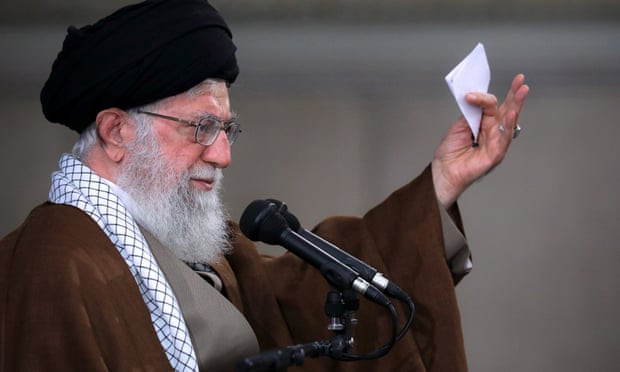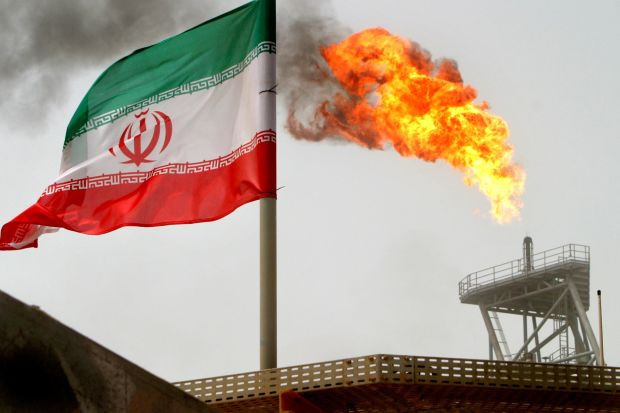How does Iran cope with US sanctions?
(Baonghean) - On November 5, 2018, all sanctions that the US had lifted under the 2015 nuclear agreement will officially come back into effect.
After the sanctions against some sectors such as gold trade, precious metals and automobiles in August this year, today's sanctions will aim to block all of Iran's most important economic sectors, especially oil. Therefore, what the public is very interested in at this time is how Iran will cope with this huge pressure from the US?
 |
| Iran's Supreme Leader Ayatollah Ali Khamenei affirmed that Iran has the support of the international community in the face of US sanctions. Photo: The Guardian |
Iran is calm
Starting today, the US will add more than 700 individuals and entities to its sanctions list related to Iran, and at the same time warn the global banking network (SWIFT) of the risk of facing US sanctions if providing services to Iranian entities on Washington's blacklist.
The US sanctions this time target the energy, shipbuilding, transportation and banking sectors, clearly demonstrating the US's intention to "tighten" Iran's economy on all fronts. To prevent companies from "evading the law", the US also introduced secondary sanctions, according to which companies will also be subject to sanctions if they do business with a company that has business activities with Iran.
There is no denying that the sanctions that the US will reimpose on Iran will have a strong impact on the economy of this Islamic country. Although Iran’s economy is not directly dependent on the US financial system, most of Iran’s largest trading partners are, and not all of them are willing to take the risk of defying the US to continue doing business with Iran.
Without sanctions, Iran's economy has already faced many difficulties as the local currency has lost more than two-thirds of its value over the past year. The situation will certainly get worse when US sanctions target sectors considered the "blood vessels" of the economy, especially oil. With bleak prospects such as reduced exports and investment, rising inflation, high unemployment, and declining consumption, financial rating agency Fitch predicts that Iran's economy will decline sharply in 2018 with a growth rate of only 1.8% before entering recession next year.
However, Iranian President Hassan Rouhani appeared quite calm. Simply, this is not the first time Iran has had to "live with" US sanctions. Compared to the nearly 40 years that the US has continuously sought to "pamper" the Iranian economy since the 1979 hostage crisis, nearly 3 years of Iran being free from sanctions is not long enough to fundamentally change the economic system of this Islamic country.
Of course, Iran's economy has been much better, being considered a potential market to welcome foreign companies in the past 3 years.
But that does not mean Iran cannot adapt if it has to return to the "circle of containment" that the US created before. Iranian President Hassan Rouhani also commented that "nothing new will happen after November 4", and said that Iran has plans to deal with the US's policy of isolating Iran. Iran has announced that although oil exports may decrease, Iran will find every way to maintain this number at a minimum of 1 million barrels/day.
A week before the US sanctions came into effect, Iran introduced e-commerce in oil sales. The advantage of trading via electronic platforms under sanctions is that customers can buy oil through intermediaries instead of buying directly from the National Iranian Oil Company (NIOC). In addition, Iran also started selling oil to private partners, offering favorable conditions to partners and storing oil on tankers at sea.
Analysts also say that while Iran’s exports will be affected, Iran and its remaining trading partners will make every effort to maintain trade. With 40 years of experience “living with” sanctions, Iran will find many ways to export oil, not to mention “looking east” to create new links with Russia and China.
A strong "shield"
In addition to Iran’s ability to adapt, US sanctions – if they want to deplete the Iranian economy – must overcome a fairly strong “protective shield”. This was predicted, because since Washington unilaterally announced its withdrawal from the Iran deal, other partners including the UK, France, Germany, Russia and China will protect this deal to the end.
This is not only about protecting the agreements on paper, but also ensuring that Iran can withstand US sanctions - a prerequisite for Iran to continue to maintain this highly symbolic agreement with the remaining partners.
So far, the countries that have spoken out most strongly in Iran's defense have been those that are US allies in the European Union - a stark contrast to the countries that closely coordinated with the administration of former US President Barack Obama in sanctioning Iran.
 |
| Iran announced that it will maintain oil export output at a minimum of 1 million barrels/day. Photo: Washington Post |
Immediately after the US President Donald Trump's government announced the re-imposition of all sanctions against Iran, France, Germany, the UK and the European Union (EU) issued a joint statement condemning the US decision and declaring that they will protect European companies that are doing legal business with Tehran. The EU will fulfill its commitment through a special financial mechanism (SPV) in international payments with Iran to bypass US sanctions.
When Iran exports oil to an EU country, the company from the receiving country will pay the SPV. Iran can then use this payment as credit to buy goods from other EU countries through the SPV. The European side confirmed that this special payment mechanism will be officially launched in the next few days. In addition, the EU also activated a law to prevent European companies from complying with US sanctions against Iran. Accordingly, the EU warned that it could impose sanctions on companies that stop doing business with Iran under the US ban.
Meanwhile, Russia also affirmed that it will continue to buy oil from Iran, saying unilateral sanctions without the approval of the United Nations are illegal. Russian Energy Minister Alexander Novak also said that, according to an agreement signed between Russia and Iran in 2014, Russia can help sell Iranian oil to a third country.
Russia will also announce next week whether it will increase its oil purchases from Iran after analyzing the impact of sanctions. In addition, among the eight countries exempted from US sanctions are major customers of Iran such as China, Turkey, India, Italy, Japan, etc., and this will contribute to Iran's goal of "maintaining a minimum of 1 million barrels per day of oil exports".
According to analysts, there are two factors for Iran to believe in the “protective shield” established by Russia, China and European countries. First, on the US side, this country will not risk destroying political relations with the remaining partners in the Iran nuclear deal, especially with allies because the US will not be able to “single-handedly” resolve other “hot spots” without these countries.
US National Security Advisor John Bolton also revealed that although the US wants to prevent Iran from exporting oil, it will not “harm friends and allies who depend on this supply”. Second, on the part of the EU, Russia and China, investing both financially and politically to protect Iran will be a way to demonstrate the independence of the powers from US policies.
The Trump administration deliberately chose November 4 – the day the 1979 hostage crisis began – as the final date before re-imposing sanctions on Iran. But over the past 40 years, the US has been unable to change Iran’s policies. Moreover, Iran remains a major regional power in terms of economy, politics and military. Therefore, whether today’s event opens another 40-year period or not, Iran is believed to have enough internal experience and external support to withstand and stand firm against US pressure.
